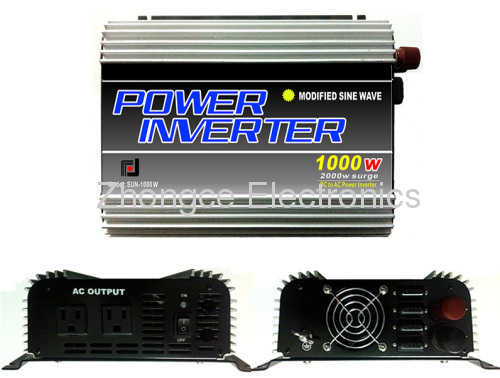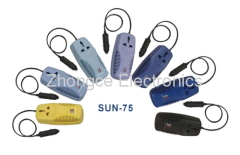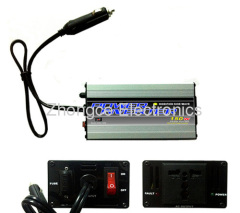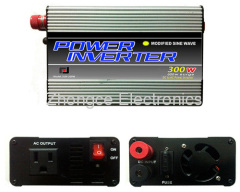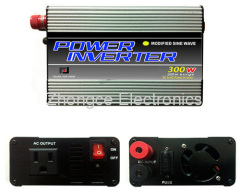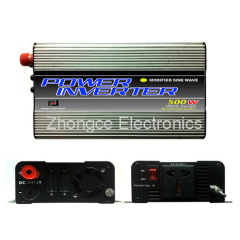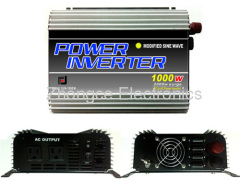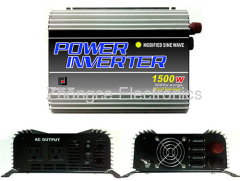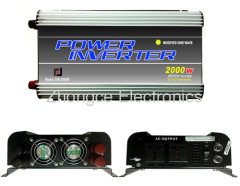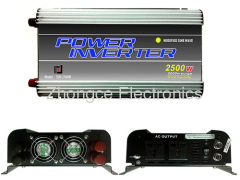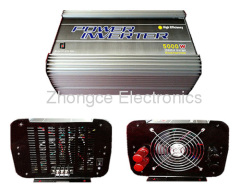|
Ningbo Zhongce Electronics Co.,Ltd.
|
1000W Modified Sine Wave power inverter
| Payment Terms: | T/T,L/C,D/A,D/P,WU |
| Place of Origin: | Zhejiang, China (Mainland) |
|
|
|
| Add to My Favorites | |
| HiSupplier Escrow |
Product Detail
1.Auto fully protection
2.LED indicators
3.High transform efficiency
4.simple,stable,no noise and no pollution
Pure sine wave and modified sine wave power inverter
Working environment
Energy source
Safety Information
Read all the Cautions and Warnings before installing and using the power inverter. The inverter must be properly installed.
The power inverter generates AC power from your DC supply (such as batteries). Treat the AC output just like you treat the AC output in your house. Keep children away from the unit.

Safety Information
Specification(@20 °C)

Safety Information
Read all the Cautions and Warnings before installing and using the power inverter. The inverter must be properly installed.
The power inverter generates AC power from your DC supply (such as batteries). Treat the AC output just like you treat the AC output in your house. Keep children away from the unit.
.Do not connect the unit to AC distribution wiring.
.Keep the unit away from water. Do not allow water to drip or splash on to the power inverter.
.Keep the unit in cool environments. Keep out of direct sunlight and away from heating vents.
.Keep the unit away from flammable material or in any location which may accumulate flammable fumes or gases.
.With heavy use, the unit will become warm and possibly hot. So keep it away from any heat sensitive materials.
.Make sure the opening to the vent holes is not blocked.
.Do not open the unit. High voltages are inside.
.Use proper size wiring. High power inverters can draw many amps from the DC source and can melt wires if not fused and sized properlySpecification(@20 °C)
DF-SUN 1000/12-230 | DF-SUN 1000/24-230 | DF-SUN 1000/48-230 | DF-SUN 1000/12-120 | DF-SUN 1000/24-120 | DF-SUN 1000/48-120 | |
Output Continuous Max. Power | 1000W | |||||
Output Surge Power | 2000W | |||||
Converting Max. Efficiency | >88% | >90% | >92% | >88% | >90% | >92% |
Normal Input Voltage | DC12V | DC24V | DC48V | DC12V | DC24V | DC48V |
Input Voltage Range | DC10~15V | DC20~30V | DC40~60V | DC10~15V | DC20~30V | DC40~60V |
Output Voltage | AC230±5% | AC120±5% | ||||
Output Frequency | 50Hz±2% | 60Hz±2% | ||||
Output Wave Form | Modified Sine Wave | |||||
No load Current(Average) | <0.15A | <0.12A | <0.10A | <0.15A | <0.12A | <0.10A |
Input Low-Voltage Alarm Voltage | 10.5±0.5V | 21±0.5V | 42±1V | 10.5±0.5V | 21±0.5V | 42±1V |
Input Under-voltage Cut Off Voltage | 10±0.5V | 20±0.5V | 40±1V | 10±0.5V | 20±0.5V | 40±1V |
Input Over-voltage Cut Off Voltage | 15±0.5V | 30±0.5V | 60±1V | 15±0.5V | 30±0.5V | 60±1V |
Measuring output voltage, please use the RMS Meter, or there will be errors between measurement and actual value. No load current is measured under the normal input voltage.
Working environment
1.Operation temperature: -10℃~40℃.
2.Storage temperature: -40℃~65℃.
3.Considerable air humidity should be less than 85%.
4.No electrical conductivity, dust explosion, corrosion-free gas in the working place.
5.No shock and vibration in the working place.
Physical properties
Physical properties
A.G.W.:1.2kgs
B.Size: 200 mm *122mm *52 mm
Energy source
Power Inverter is powered by batteries or DC suppliers. For batteries or DC suppliers, the output voltage must be in the prescriptive range of the inverter's input voltage and the output current should meet inverter's operation requirement. The detail requirement depends on the power of loads. If with the battery power supplying, the using time of battery has the relationship with the battery capacity and the power of the connected load. When the battery is full, the simple calculating method of the using time is shown as below:
Time (Hour) = battery capacity (AH)÷[electrical power of using (W)÷q (V)]. The 'q' depends on the battery voltage. Referring to the 12V battery, q = 10; referring to the 24V battery, q = 20; referring to the 48V battery, q = 40. Such as the 12V DC input inverter uses the 12V battery, if the battery capacity is 200AH and at this time the inverter is driving 400W power load, when the battery is full, according to the formula above, the battery use time = 200 (AH)÷[400 (W)÷10 (V)] = 5 (Hour). This means the battery can be used for 5 hours.
The capacity of the batteries must be large enough when big power loads are used.
Appliance connection
Appliance connection
1.Attention the positive pole and negative pole when wiring. Connect one "O" terminal of red cable to the red terminal of the inverter's DC input "+" and another "O" terminal to the positive terminal of the DC supply; connect one "O" terminal of black cable to the black terminal of the inverter's DC input "-" and another "O" terminal to the negative terminal of the DC supply.
2.Switch on the inverter. If the indicator LED is green, it means it works properly, if the LED is red, and alarm will beep, it means the inverter is faulty and if so please turn off the inverter immediately and check the inverter.
3.Insert the appliance plug into the inverter's AC output outlet. Switch on the inverter. If the indicator is green, the appliance can work properly. The inverter has soft-start function.
4.When the inverter is working, if the alarm beeps, the indicator LED would take red, which means the inverter is faulty. Corresponding fault can be identified as shown in the section "Security feature". After fixing the fault, you can restart it.
Didn't find what you're looking for?
Post Buying Lead or contact
HiSupplier Customer Service Center
for help!
Related Search
Sine Wave Power Inverter
Pure Sine Wave Power Inverter
Modified Sine Wave
Modified Sine Wave Inverters
Sine Wave Inverter
Pure Sine Wave Inverter
More>>

